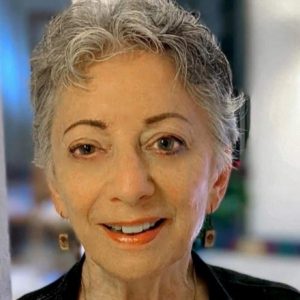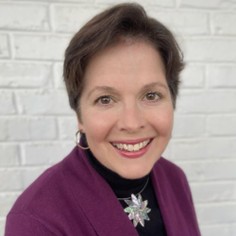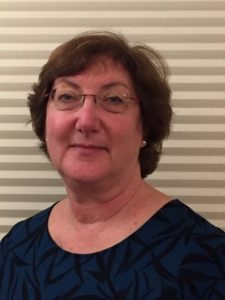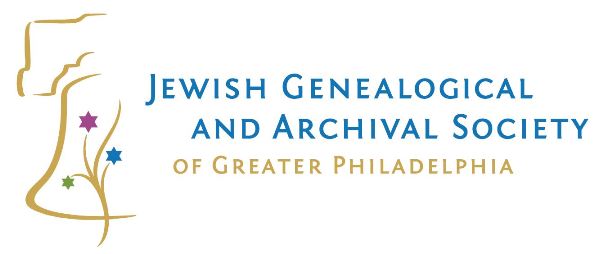Our Past 2025 Events
Sunday, January 12, 2025 at 1:30 pm
(1 pm for Schmoozing and Mentoring)
Zoom Only Meeting
Speaker: Andrea Bentschneider, Professional Genealogist based in Hamburg, Germany

Andrea Bentschneider, a highly respected professional genealogist based in Hamburg, Germany, is renowned for her expertise and contributions to the field of genealogy. Since establishing “Beyond History” in 2004, she has emerged as Germany’s foremost expert in genealogical research. Andrea’s proficiency has led her to feature prominently in various national and international television formats, including shows like “Who Do You Think You Are?” and “Finding Your Roots,” as well as being a regular guest on German radio and TV programs. Her firm specializes in diverse genealogical services, including ancestor research, World Wars documentation, Jewish family research, and assistance with citizenship applications, catering to clients globally.
Since 2013, Andrea has served as the President of the Association of German-speaking Professional Genealogists, setting modern standards and accreditation in the field. She joined the board of the International German Genealogy Partnership as a Director at-large in 2024. A passionate educator, she regularly conducts webinars and presentations in English and German at various conferences, notably captivating audiences at RootsTech, IGGP and IAJGS conferences . With over 20 years of professional experience, Andrea and her team have completed more than 2,000 research projects, aiding over 1,800 clients. Her work philosophy, “We give your ancestors a voice and tell their stories,” reflects her commitment to uncovering and honoring the narratives of ancestors. Andrea’s global perspective.
Topic: Voyage of Hope and Hardship: The 19th Century Emigration Experience through German ports – Atlantic Crossing Realities and Requirements
During the 19th and early 20th centuries, a massive wave of emigrants, embarked on arduous journeys from German ports such as Hamburg, Bremen, and Stettin, seeking new lives across the Atlantic. This presentation delves deeply into the historical context of German emigration, emphasizing the compelling reasons behind these monumental decisions, with a particular focus on Jewish emigrants. It explores in detail the challenging conditions faced during the ocean crossing – from the financial burdens and lengthy travel durations to the often harsh and cramped conditions aboard the ships. The talk also highlights the phenomenon of indirect emigration, where Hamburg emerged as a pivotal transit point, leading to many emigrants becoming unexpectedly stranded in the UK, unable to reach their final destinations. The final segment of the presentation is dedicated to unveiling the rich tapestry of records and sources available for tracing these emigrant ancestors, including specialized lists of Jewish emigrants departing from Hamburg and other valuable resources that illuminate the paths of those not found in conventional passenger departure records.
Sunday, February 2, 2025 at 1:30 pm
(1 pm for Schmoozing and Mentoring)
Zoom Only Meeting
Speaker: Susan Weinberg, Author, Researcher, and Speaker

Susan Weinberg is an artist, author, researcher, and frequent speaker on genealogy topics. Her creative work often involves storytelling and frequently explores family history themes. Susan is the president of the Minnesota Jewish Genealogical Society (MNJGS) and serves on the board of IAJGS and the Jewish Historical Society of the Upper Midwest. She developed the Jewish Identity and Legacy Project, an oral history project with Jewish elders, then authored the book We Spoke Jewish: A Legacy in Stories that includes oral history, artwork, and history on three groups of Jewish immigrants who spanned the 1900s. Susan has created Kehilalinks for several ancestral towns, worked as a volunteer with JRI-Poland and coordinated the Radom BOF at prior conferences. She writes frequently for publications on genealogy topics and does genealogy research for clients around the world.
Topic: Mining the Manifest
An immigration manifest connects old to new and thus can be a powerful source of information if you know how to mine it. After 1906, immigration manifests offer a wealth of information, but what do you do if your family came over prior to that time? This presentation explores the immigration period from the early 1890s through 1906, a period which begins to offer useful information for a genealogical search. Using a case approach, we will look at derivative naturalization documents, trace contacts they were going to through the NY vital records and follow immigrants who found their route through Canada. Once in New York, we will explore how you can follow their journey outside of New York. We will explore cases with name changes and variable spellings, work back from other documents, and resolve conflicting data.
Sunday, March 2, 2025 at 1:30 pm
(1 pm for Schmoozing and Mentoring)
Zoom Only Meeting
Speaker: Phil Goldfarb, President JGS of Tulsa
Researching genealogy for 35 years, Phil is the founding and current President of the JGS of Tulsa which he started in 2005. He has lectured extensively on various topics in genealogy, published articles on genealogy in numerous periodicals, and authors a monthly column in the Tulsa Jewish Review. He has written two books titled “A Page of History: Passport Applications 1851-1914” and “A Page of History: Passport Applications Volume II 1915-1925.” He was the Chairman of the 2020 IAJGS Awards Committee and sits on the Board of Directors for several non-profit organizations. In July 2020 he won an Emmy Award as a Producer for the Tulsa Historical Society’s documentary titled: L’dor V’dor Generation to Generation: A History of Tulsa’s Jewish Community which has been shown on PBS stations around the U.S. In his career, he has personally given over 2,000 presentations as well as teaching a course on presentation skills. He is also the Editor of The Weekly News Nosh published on the L’Dor V’Dor Foundation website.
Topic: The History, Unusual Facts, and Under-Utilized Records of the United States Census
This program will discuss the history of the Census, facts and unusual facts about the Census, the first U.S. census in 1790, the process of taking the Census, State Census records, as well as little known and under-utilized census records such as Mortality Schedules, the 1885 semi-decennial census, Social Statistics and Non-Population Schedules, Native American Census and Slave Schedules. You will learn about records that you will never know has existed!
Sunday, March 23, 2025 at 2:30 pm,
(2 pm for Schmoozing and Mentoring)
Hybrid Meeting – In Person Venue: Rodeph Sholom, 615 N. Broad St., Philadelphia, PA 19123, Community Room
Speaker: Rabbi Lance Sussman, Emeritus Rabbi Keneseth Israel and Historian

Lance J. Sussman has taken on many roles as a thought-leader in the Jewish community. In his 40+ years as a rabbi, Sussman’s insights and expertise have brought a fresh perspective on the issues of the American Jewish experience. Throughout his career, Sussman has been an active scholar, writer, educator, and public speaker.
As Senior Rabbi at Reform Congregation Keneseth Israel in Elkins Park, PA, for more than 20 years, Sussman left his mark on the synagogue and its community that will be woven through its history for decades to come. Now that he has retired as a pulpit rabbi, Sussman has set his sights on a new and expanding role in the Jewish community.
Topic: The Remarkable Jewish Story of the National Farm School
In 1896, Rabbi Joseph Krauskopf of Reform Congregation Keneseth Israel, purchased a 100-acre farm in Doylestown with the intention of starting a school that would attract Russian Jews – helping them to start a new life in a new country. Learn more about what led this esteemed Philadelphia rabbi to undertake this remarkable project — and how it ultimately resulted in the creation of Delaware Valley University.
Sunday, April 27, 2025 at 2:30 pm
(2 pm for in-person Schmoozing and Mentoring)
Hybrid Meeting – In Person Venue at Main Line Reform, Orleans Room (downstairs)
Speaker: Carol Moskot, Award-Winning Publication Designer and Art Director and Child of Holocaust Survivors

Carol Moskot is an award-winning magazine art director, visual journalist and writer who resides in Montclair, New Jersey. Her article, The Five Postcards, the Holocaust story of her Grandfather, has been published in Canada and the United States. Find her work at www.carolmoskot.com.
Topic: The Last Letters: An Enthralling Investigation of a Jewish Family Devastated by the Holocaust and Partly Restored through the Power of Genealogy and Storytelling.
During Passover 2022, Carol Moskot receives an envelope from her mother, Agnes Moskot, containing five postcards. Written by Agnes’ father, László Braun, these were the last letters his wife, Elizabeth Braun, received from him during the Second World War.
Eighty years after they were written, and almost a year after receiving them, Carol uncovers what her grandmother could never share: the enduring love between two young Hungarian Jews caught in the turmoil of wartime Hungary. With the help of translators, a journalist, and others, she embarks on a quest to uncover her grandparents’ fate. What emerges is a poignant story and a genealogical journey that breaks the silence surrounding her family, her heritage, and herself. The survival of Carol’s grandmother and mother Thanks to the heroic actions of Swiss diplomat Carl Lutz, Carol’s grandmother and mother survived the Holocaust.
Sunday, May 18, 2025 at 2:30 pm
(2 pm for in-person Schmoozing and Mentoring)
Hybrid Meeting – In Person Venue at Main Line Reform, Hausen Auditorium
Speaker: Michelle Tucker Chubenko, Professional Genealogist, AG®, AGL™
 Michelle is accredited in the Mid-Atlantic region of the United States through the International Commission for the Accreditation of Professional Genealogists (ICAPGen) and specializes in the Mid-Atlantic region and Eastern European research. She has served as Program Chair for the Monmouth County Genealogy Society and Trustee with the Genealogical Society of New Jersey. Also, Michelle is a founding member with the “Nashi Predky/Our Ancestors” Family History Group at the Ukrainian History and Education Center (Somerset, New Jersey) and in 2023, coordinated the institute course Researching Your Ancestry in the Crownland of Galicia, Austria-Hungary. Since 2021, she has hosted a monthly Q&A Zoom session Have Questions? Get Answers for Research in Galicia.
Michelle is accredited in the Mid-Atlantic region of the United States through the International Commission for the Accreditation of Professional Genealogists (ICAPGen) and specializes in the Mid-Atlantic region and Eastern European research. She has served as Program Chair for the Monmouth County Genealogy Society and Trustee with the Genealogical Society of New Jersey. Also, Michelle is a founding member with the “Nashi Predky/Our Ancestors” Family History Group at the Ukrainian History and Education Center (Somerset, New Jersey) and in 2023, coordinated the institute course Researching Your Ancestry in the Crownland of Galicia, Austria-Hungary. Since 2021, she has hosted a monthly Q&A Zoom session Have Questions? Get Answers for Research in Galicia.
Topic: Digging for Roots in the Garden State
Michelle will provide an introduction to many of New Jersey’s best reference materials for 19th-20th century genealogical research. Discover how to effectively locate vital records, probate records, and important websites that are useful for your research.
Sunday, June 22, 2025 at 2:30 pm
(2 pm for in-person Schmoozing and Mentoring)
Hybrid Meeting – In Person Venue at Main Line Reform, Hausen Auditorium
Speaker: David Lee Preston, Author and Journalist
 David retired in 2020 as Justice and Injustice Editor at The Philadelphia Inquirer, where he was a finalist for the 1986 Pulitzer Prize in feature writing for “Journey To My Father’s Holocaust,” chronicling a monthlong trip with his father, George Preston, to Auschwitz, Buchenwald, and other places of his father’s past. His mother, Halina Wind Preston, a native of Turka-nad-Stryjem in the Carpathian foothills of Galicia, was one of 10 Jews who survived together for 14 months in the sewers of Lviv, saved by Polish Catholic sewer workers. His Mother’s Day 1983 article “A Bird in the Wind,” published five months after his mother’s death and praised by historian Michael Berenbaum as “the best article written on the life of a survivor,” was the first English-language presentation of the Lviv sewer survival story later dramatized by the Polish director Agnieszka Holland in her Oscar-nominated 2011 movie “In Darkness.” Halina Wind Preston became a Jewish educator and the first survivor of the Nazis to speak across the United States about her experiences, with 40 appearances in 30 cities from 1949 to 1953. Her son, born in 1955, visited her mountain town after the fall of the Soviet Union, and wrote about it in “Speaking for the Ghosts: A Story for My Mother,” the third article in his trilogy of cover stories about his parents in the Inquirer’s old Sunday magazine. He writes a newsletter about his parents that is archived on his website. His YouTube channel includes recorded book programs he hosts over Zoom for Sons & Daughters of Holocaust Survivors of Greater Philadelphia, founded in 1979. He lives in Center City Philadelphia with his wife, Ronda B. Goldfein, executive director of the AIDS Law Project of Pennsylvania. Their 1992 wedding was attended by millions who read about it – and about his mother – in the epilogue of James McBride’s international bestseller “The Color of Water.”
David retired in 2020 as Justice and Injustice Editor at The Philadelphia Inquirer, where he was a finalist for the 1986 Pulitzer Prize in feature writing for “Journey To My Father’s Holocaust,” chronicling a monthlong trip with his father, George Preston, to Auschwitz, Buchenwald, and other places of his father’s past. His mother, Halina Wind Preston, a native of Turka-nad-Stryjem in the Carpathian foothills of Galicia, was one of 10 Jews who survived together for 14 months in the sewers of Lviv, saved by Polish Catholic sewer workers. His Mother’s Day 1983 article “A Bird in the Wind,” published five months after his mother’s death and praised by historian Michael Berenbaum as “the best article written on the life of a survivor,” was the first English-language presentation of the Lviv sewer survival story later dramatized by the Polish director Agnieszka Holland in her Oscar-nominated 2011 movie “In Darkness.” Halina Wind Preston became a Jewish educator and the first survivor of the Nazis to speak across the United States about her experiences, with 40 appearances in 30 cities from 1949 to 1953. Her son, born in 1955, visited her mountain town after the fall of the Soviet Union, and wrote about it in “Speaking for the Ghosts: A Story for My Mother,” the third article in his trilogy of cover stories about his parents in the Inquirer’s old Sunday magazine. He writes a newsletter about his parents that is archived on his website. His YouTube channel includes recorded book programs he hosts over Zoom for Sons & Daughters of Holocaust Survivors of Greater Philadelphia, founded in 1979. He lives in Center City Philadelphia with his wife, Ronda B. Goldfein, executive director of the AIDS Law Project of Pennsylvania. Their 1992 wedding was attended by millions who read about it – and about his mother – in the epilogue of James McBride’s international bestseller “The Color of Water.”
Topic: Finding Hope Underground
Ten years ago, emptying his childhood home in Wilmington, Delaware, the award-winning Philadelphia journalist David Lee Preston, a son of Holocaust survivors, got the biggest scoop of his career when he found an envelope marked by his mother in pencil Kanał (Polish for Sewer). Carefully he pulled out a tattered green handkerchief and four soiled notebooks filled with 167 pages in Polish written by his mother while she hid from the Nazis for 14 months in the sewers of Lviv in 1943-44. At this session, he will discuss his discovery and read passages of his mother’s original poetry and prose translated from those sewer notebooks.
Sunday, July 13, 2025 at 3:30 pm
(3 pm for Schmoozing and Mentoring)
Zoom Only Meeting
Speaker: Sunny Jane Morton, Family Tree Magazine, Contributing Editor
 Sunny Jane Morton is a Contributing Editor at Family Tree Magazine and the Content Director at YourDNAGuide.com. She is past Editor of Ohio Genealogy News. She has twice received awards from the National Genealogical Society, most recently for her book How to Find Your Family History in U.S. Church Records, co-authored with Harold Henderson, CG.
Sunny Jane Morton is a Contributing Editor at Family Tree Magazine and the Content Director at YourDNAGuide.com. She is past Editor of Ohio Genealogy News. She has twice received awards from the National Genealogical Society, most recently for her book How to Find Your Family History in U.S. Church Records, co-authored with Harold Henderson, CG.
Her other book, Story of My Life: A Workbook for Preserving Your Legacy, is now in its 2nd edition. She coordinated a course for the GRIP Genealogy Institute in 2024, and in 2025 will be an instructor for GRIP and the Salt Lake Institute of Genealogy (SLIG).
Topic: Comparing the U.S. Newspaper Giants: What Jewish Content Do They Have?
Over a billion digitized newspaper pages are now searchable at online historical newspaper archives such as Chronicling America, Fulton History, GenealogyBank, Storied.com (formerly NewspaperArchive) and Newspapers.com. But which should you use? Is it worth subscribing to one of the premium sites?
Learn how they stack up for total amount of digitized content (including Jewish newspapers); geographic coverage; unique features and tools; and subscription options.
Learn how Goldie May can help you find newspaper collections across many websites. My tips, encouragement, and comparative analyses will help you more confidently choose and use newspaper websites
SPECIAL EVENT
Sunday, September 14, 2025
2:30 PM (2 pm for Schmoozing and Mentoring)
Hybrid Meeting – In Person Venue Main Line Reform Temple, Wynnewood, PA
Meeting will start with a special introduction followed by a Dessert Reception and The Steve Schecter Memorial Lecture
Speaker: Benjamin Nathans, Alan Charles Kors Associate Professor of History, University of Pennsylvania

Benjamin Nathans is the Alan Charles Kors Associate Professor of History at the University of Pennsylvania. He teaches and writes about Imperial Russia and the Soviet Union, modern European Jewish history, and the history of human rights. He is the author of the multiple award-winning book Beyond the Pale: The Jewish Encounter With Late Imperial Russia. His latest book, To the Success of Our Hopeless Cause: The Many Lives of the Soviet Dissident Movement, tells the story of dissent in the USSR from Stalin’s death to the collapse of communism. Nathans is a frequent contributor to the New York Review of Books and the Times Literary Supplement.
Topic: Selective Integration: The Evolving Legal Status of Jews in Imperial Russia, 1795-1917
By the middle of the nineteenth century, more Jews lived in the Russian Empire than in any other country in the world. Eager to modernize their relatively backward agrarian kingdom, Russia’s rulers enacted a series of laws designed to integrate “useful” Jews, mimicking the results of emancipation in Western Europe without creating a society of equal citizens. Jewish elites played a surprisingly important role in this process, whose striking consequences became visible well before the revolution that swept away the empire itself.
Sunday, October 19, 2025
1:30 PM (1 pm for Schmoozing and Mentoring)
Zoom Meeting
Speaker: Phyllis Berenson, Director of JewishGen’s Ukraine Research Division

Phyllis serves as JewishGen Ukraine Research Division Director, which has added 4 million records to the JewishGen database in the last 2.5 years. She founded the Mogilev Podolskiy and Shargorod town research groups and is Town Leader for both.
Her checkered employment history includes social worker, bookstore owner, carpenter’s assistant, professional harpist, trust, estates and tax lawyer, as well as symphony orchestra manager. She is thrilled to finally have the opportunity to use her Russian language background in her Ukraine work at JewishGen.
Topic: Ukraine Genealogy Research in 2025: New Sources and Tips
Opportunities for finding ancestral information in Ukraine records are increasing, even as war continues in Ukraine. The Ukraine Research Division of JewishGen expects to double its transcription rate and the resulting output for researchers, beginning in the second half of 2025. Phyllis Berenson, Director of the Ukraine Research Division will discuss the newly available records, how to access them, and research tips.
Sunday, November 16, 2025
1:30 PM (1 pm for Schmoozing and Mentoring)
Hybrid Meeting – In Person Venue Reform Congregation Keneseth Israel, Elkins Park, PA
Speaker: Sydney Cruice, Professional Genealogist

Sydney F. Cruice is a professional genealogy researcher, writer, teacher and international lecturer with over 25 years of experience. She has lectured at many Institutes and conferences including: IAJGS, IGGP, SLIG, IGHR, RFIPA. For over seven years she developed the curriculum and taught the genealogy courses at the Historical Society of Pennsylvania. She also served as the President of the Association of Professional Genealogists for the Greater Philadelphia Area Chapter for the past 6 years. Sydney’s article, “A Family Secret: Desertion, Scurvy, and President Lincoln” was the featured cover story for NGS Magazine in October of 2018.
Topic: Utilizing Probate Records to Solve Family Mysteries
Probate records can solve many of the toughest genealogy mysteries. They often describe family relationships and can give you clues to the relationships in multiple generations. We will discuss the probate process and the best ways to access these records. We go through case studies to show how you can maximize their information by using them with other genealogical sources.
For those who have access to the registered user sections of the website, Sydney’s handout is available on the Meeting Summaries and Handouts page
Sunday, December 21, 2025
1:30 PM (1 pm for Schmoozing and Mentoring)
Zoom Meeting
Speaker: Robinn Magid, President, Jewish Records Indexing – Poland

Robinn Magid is the head of JRI-Poland.org and serves as the project manager of the NextGen project which has already succeeded in replacing the old website and is now focused on converting JRI-Poland to a more modern database and search results system with extended features and abilities. Robinn is a past chair of two landmark IAJGS conferences: the 2018 Warsaw Conference and 2020 First Virtual IAJGS Conference. She is a recipient of the IAJGS Lifetime Achievement Award and a member of the SFBA-JGS. Robinn lives in Berkeley, California.
Topic: 18th, 19th and 20th Century Research with JRI-Poland
The JRI-Poland data collections can help genealogists draw a more complete picture of their ancestors’ lives. Come learn how we are exploring whatever traces we can find of our ancestors’ presence in the current or former territories of Poland. This official JRI-Poland session will highlight the breadth and depth of the JRI-Poland database including vital records population and legal records surviving from the Kingdom of Poland, the Russian, Prussian and Galician Empire. Join us for a glimpse into the past! A question-and-answer session will be included in this lively session.
